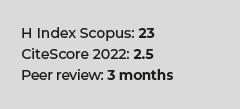Progression of chronic renal disease in a reference hospital of Social Security of Peru 2012-2015
DOI:
https://doi.org/10.17843/rpmesp.2017.342.2493Keywords:
Chronic renal disease, Survival, Progression of disease, PeruAbstract
Objectives. To describe the characteristics of the population with chronic kidney disease (CKD) stage 3 and 4, to determine the factors associated with CKD progression and admission to renal replacement therapy (RRT), as well as renal survival. Materials and methods. Longitudinal retrospective study of patients referred between January 2012 and December 2015 to the Renal Health Unit of the Hospital Nacional Edgardo Rebagliati Martins (HNERM), who were evaluated and followed by a multidisciplinary team. The clinical and laboratory data for each query were recorded in a software created specifically for the program. A multivariate logistic regression analysis was performed to assess the factors associated with the progression of CKD, a Cox regression model to predict the risk of entering RRT and the Kaplan-Meier method for renal survival analysis. Results. We assessed 1248 patients in stage 3A: 248 (20%), stage 3B:548 (44%) and stage 4: 452 (36%). 352 (28%) progressed, being proteinuria the most important progression factor (OR: 3.2; CI 95%: 2,2-4.6). Proteinuria increases the risk of admission to RRT in four times and having a glomerular filtration rate < 30% in 3.6 times. Median follow-up was 12 months (RIC 5-27 months). 92 patients (7%) required to initiate RRT. Renal survival at 12 months of follow-up was 96% and at 24 months was 90%. Conclusions. Our study shows that in a specialized center a significant proportion of patients with CKD does not progress in their disease and that the factor that is most associated with progression of disease and at the onset of RRT is proteinuria.
Downloads
Downloads
Published
Issue
Section
License
Copyright (c) 2017 Revista Peruana de Medicina Experimental y Salud Pública

This work is licensed under a Creative Commons Attribution 4.0 International License.


























